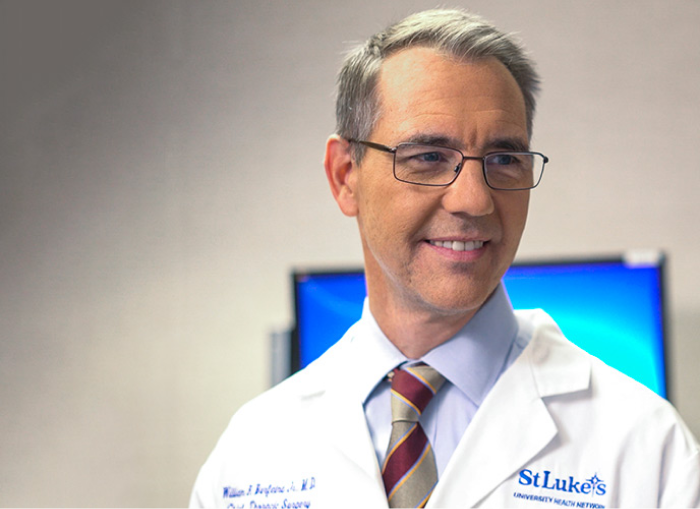Dr. Burfeind’s Story
Thoracic Surgeon
With lung cancer responsible for more than 158,000 deaths annually in the United States, it is one of cancer’s biggest killers of both men and women - which is why early detection is so important.
“Screening for lung cancer saves lives,” states William R. Burfeind, Jr., MD, St. Luke’s chief of surgery and fellowship-trained cardiothoracic surgeon. “We see it every day. Someone who may have been a smoker in the past – and appears perfectly healthy – can be diagnosed early with the help of a low-dose CT scan.”
St. Luke’s Cancer Center offers these scans to patients who are referred by their primary care physician. Individuals between the ages of 50-80 years old who have smoked a pack a day for 20 years are eligible.
“Don’t be afraid to discuss your smoking history with your doctor,” recommends Dr. Burfeind. “Unfortunately most lung cancers are caught in Stages III and IV, when the cancer has already spread and is difficult to treat. When we identify lung cancer in Stages I or II, when it is most curable, we have a much better shot at a positive outcome.”
St. Luke’s screens approximately 80-100 people each month and typical finds cancer in 1 out of 100 cases.
And then there are the anomalies, like Greg Makarchuk of Bethlehem, who have never smoked a day in their lives. “Greg’s case was unique in that he was a non-smoker. Unfortunately, lung cancer is not limited to only people who smoke. It can develop for any number of reasons,” states Dr. Burfeind.
“Greg presented with difficulty breathing. He had gone to his family doctor to find out what was going on and his family doctor sent him for further testing,” Dr. Burfeind says. “I have many patients who are alive today because they were ‘lucky enough’ to have had pneumonia or some other health problem that raised a red flag. Listen to your body and know when to visit your doctor.”

Many patients choose to enroll in a clinical trial that is focused on their particular type of cancer. St. Luke’s offers multiple clinical trials for lung cancer.
“Clinical trials are extraordinarily important at St. Luke’s,” says Dr. Burfeind. “We build a portfolio of trials and are proud that 18 percent of our patients are enrolled in a clinical trial. To put that in perspective – a high performing organization typically only has about six percent of patients on clinical trials. So we are three times better than the national average.”
“If we are going to figure out how to beat lung cancer, we need to develop new treatments – and that’s what clinical trials are about.”
Learn more about clinical trials available at St. Luke’s.
At St. Luke’s, our cancer patients benefit from all of that, plus an unparalleled level of support and compassion. You are not alone – we are with you every step of the way. Whether you are newly diagnosed or looking for a second opinion, we are here to help. Call St. Luke’s HopeLine – one number for all your needs: 484-503-HOPE.